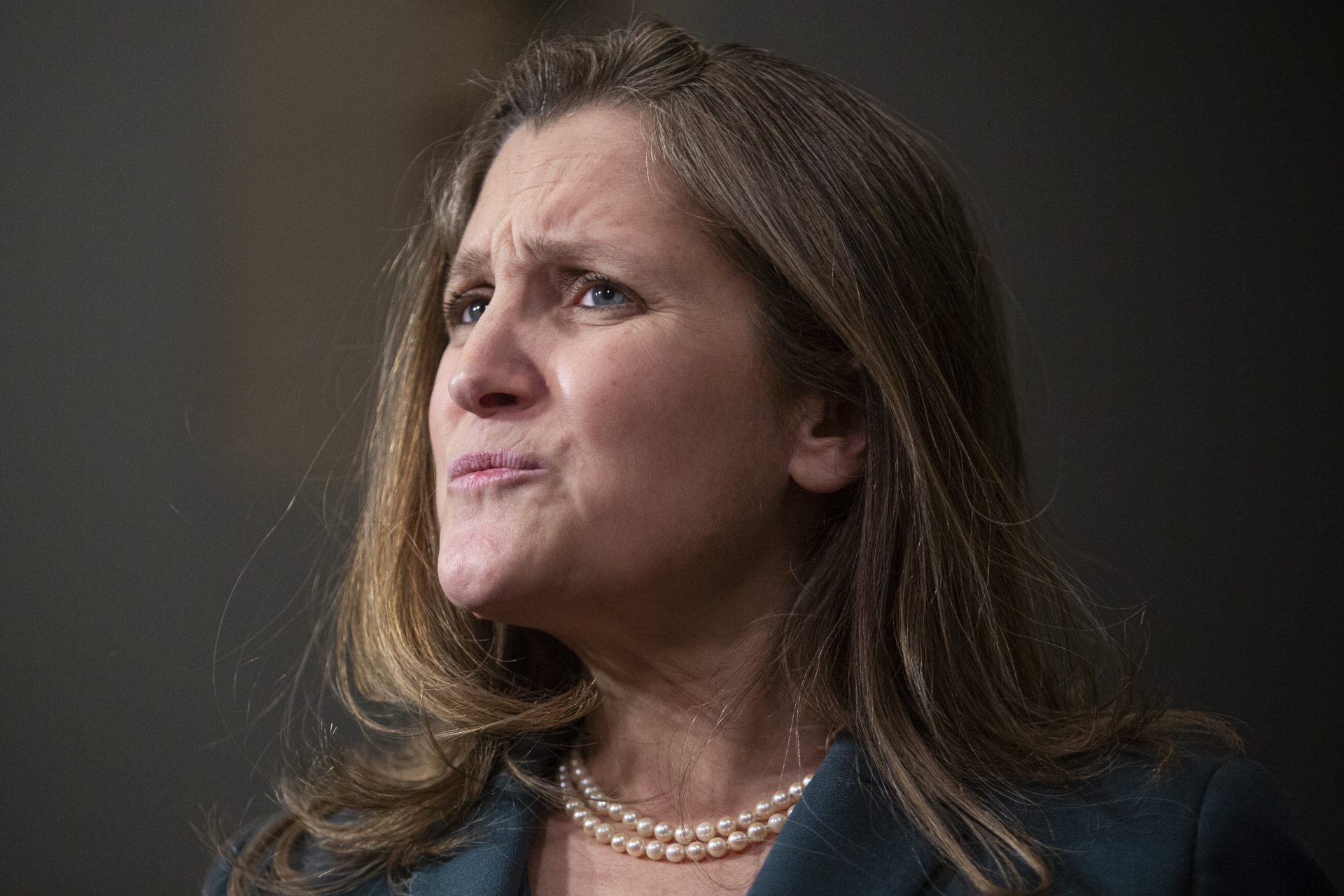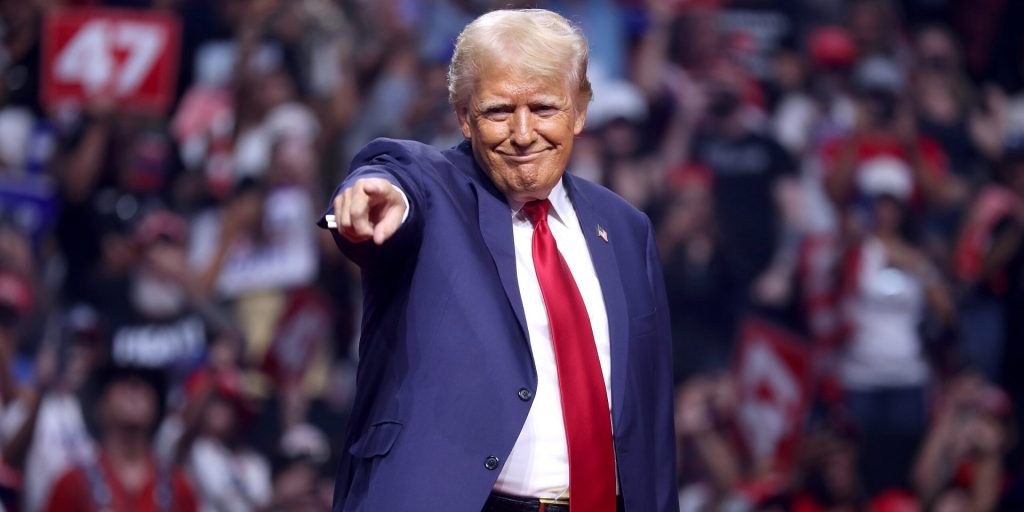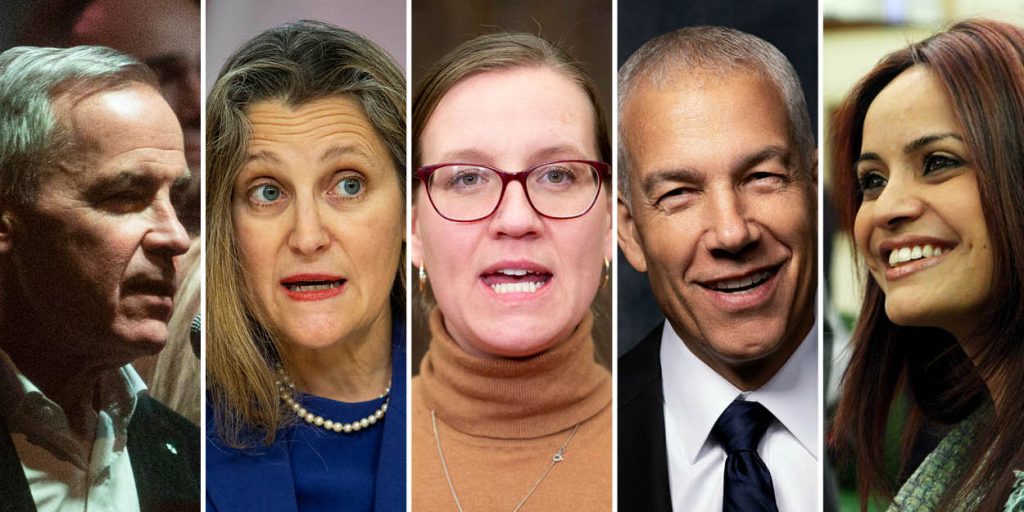Freeland’s proposed U.S. bid ban is ‘extreme’ and ‘unrealistic,’ could hurt Canada, say observers

Liberal leadership hopeful Chrystia Freeland’s proposed procurement bans against American firms in response to the U.S. president’s tariff threats are “unrealistic” and “populist” attempts to draw attention to her campaign, observers say, noting that while the move helps set her apart from other candidates, such boycotts could further strain bilateral relations.
In Jan. 27 social media post, former deputy prime minister and finance minister Freeland (University–Rosedale, Ont.) outlined her six-point “plan to protect the Canadian economy” in response to U.S. President Donald Trump’s threats to impose 25-per-cent tariffs on goods from this country. That threat is looming over Canadian companies and consumers with Trump’s stated Feb. 1 deadline just hours away. Although a Jan. 31 Reuters report suggested that Trump was newly eyeing a March 1 date to implement tariffs, the White House said that was “false.”
“The president will be implementing tomorrow 25-per-cent tariffs on Mexico, 25-per-cent tariffs on Canada, and a 10-per-cent tariff on China for the illegal fentanyl that they have sourced and allowed to distribute into our country which has killed tens of millions of Americans,” White House press secretary Karoline Leavitt said. “These are promises made, and promises kept by the president.”
Freeland’s proposed plan would direct all federal government agencies to stop purchasing any goods from American companies, would block U.S. firms from bidding on Canadian federal procurement contracts, and ban them—and well as U.S.-based branches of international firms—from all projects funded by the Canadian government. This would exclude defence contracts, which account for the largest procurements between the countries worth billions of dollars.
Freeland’s media team did not respond to The Hill Times’ questions on how the plan would be implemented, but experts say putting it into action could be a challenge.

Vivek Astvansh, an associate professor at McGill University with expertise in Canada-U.S. trade relations, described Freeland’s proposal as “a very extreme and populist remark, perhaps to receive attention.”
Astvansh argued that it is an unlikely scenario that the plan would play out. “It’s not a measured political, diplomatic move. It’s unrealistic, and it’s not really benefiting Canada,” he said.
Canada holds little bargaining power with U.S., which can easily secure new trading partners given its global dominance. However, “Canada would have to struggle because it has not forced those deep trade relations with other countries, so has less leverage,” according to Astvansh, despite that such a ban would “severely dent” U.S. firms.
“Canada should wait and watch, and in the meantime, try to lobby with the people in Trump’s inner circle and the governors of various states, and in parallel, deepen its trade relations with countries such as Japan, China, and Germany,” Astvansh said.
Bans would be ‘incredibly challenging to implement’: Mills
Freeland’s proposal lacks a clear strategy for replacing suppliers once U.S. firms were blocked from federal procurement, argued Marcia Mills, a partner at Fasken law firm specializing in government procurement. “It’s just block and ban. Fine. But how are you going to replace these suppliers? That’s where her plan has a major gap.”
The former minister “would be incredibly challenged to implement” the proposed bans, according to Mills.
“She is basically recommending that the government completely change the way that it buys goods and services. Is it doable? I don’t see how it could be, unless she can somehow—in her American blocking effort—not damage all of the relationships with all of the other countries that Canada has trade agreements with,” Mills said.
Mills explained that under these trade agreements, “the principle is to reduce and eliminate trade barriers.” Canada, while complying with the agreements, cannot block bidders from other signatory countries.
“Those bidders would have remedies before the Canadian International Trade Tribunal if the only reason they are not being permitted to bid is their affiliation with the U.S., whether they are a U.S. company or a U.S. subsidiary,” she said.
Canada is part of three international deals related to government procurement: the World Trade Organization Agreement, the Canada-U.S.-Mexico Agreement (CUSMA), and the 2010 Canada-U.S. Agreement on Government Procurement, all of which pacts provide American firms with access to Canadian federal projects.
“I suppose when confronted by hostile actions by a rule-breaker, it is natural to want to retort that two can play at that game. But in this case, Canada is weaker and more vulnerable in the short term,” said Christopher Sands, director of the Canada Institute at the Washington, D.C.-based Wilson Center.
Sands underlined that blocking U.S. firms from participating in this country’s federal procurement would violate CUSMA. “But I imagine that Canada would claim that tariffs also violate it, and so the matter could be litigated in front of the Canadian International Trade Tribunal, or submitted to an arbitration panel,” he said.
Sands predicted that the U.S. would reciprocate a ban, leading to Canadian firms losing access to American federal procurement. Sands explained that the provinces are much bigger purchasers of goods and services, and they would also have to agree individually to block American firms’ access to procurement for “maximum impact.” Sands also highlighted that U.S. firms could sell to a Canadian subsidiary or intermediary firm that would sell to the Canadian government to circumvent a ban.
Mary Anne Carter, principal with Earnscliffe Strategies who previously oversaw federal procurement files at the Canadian Chamber of Commerce, argued that Freeland is “using procurement as a way to separate herself from the other candidates to show how hard she would hit back” against Trump’s tariffs.
“I think she’s taking this very seriously. Her goal is to demonstrate that Canada is not weak. [Procurement] is another angle beyond item-by-item tariffs that could hurt various sectors of the U.S. economy,” Carter said.
If such procurement bans were brought in by any future Canadian leader, that would be “a significant policy shift to a more protectionist regime in Canada,” and would have unintended consequences, argued Carter.
“What’s important to know is that even though it would impact U.S. sectors, it’s not necessarily a win for Canada,” Carter said, stressing Canadian federal procurement is “quite reliant” on American companies.
“It would continue to disrupt our closely intertwined economic relationship and various supply chains—ranging from anything from EV batteries in the auto sector to critical minerals to agricultural industries, and energy projects,” she said, adding that it would also drive up costs and limit innovation for various federal projects.
Carter also underlined that many Americans may not realize how much their jobs currently depend on Canadian supply chains and procurement, but if U.S. firms lose multimillion-dollar contracts due to Canada’s retaliation, that pressure felt could create a different political dynamic south of the border.
Speaking at the World Economic Forum on Jan. 23, Trump said U.S. does not need Canadian fossil fuels, vehicles, or lumber. Trump’s reasoning for imposing tariffs has been tied to his claims that his nation has a trade deficit with Canada, citing more than a $200-billion gap, though the source of that number is unclear. In 2023, the U.S. had a trade deficit of US$67.9-billion with Canada, according to Commerce Department data. A Jan. 21 TD Economics report says the U.S. is on track to record a trade deficit of about US$45-billion with Canada in 2024, and that U.S. energy imports are the primary driver of the deficit.
U.S. could bite back on boycott
Observers say there is not enough publicly available data to fully assess the volume of federal government procurement between Canada and the U.S.
Alex Greco, senior director of manufacturing and value chains at the Canadian Chamber of Commerce, told The Hill Times that while proposed boycott “could create new opportunities for Canadian manufacturers, they risk disrupting established manufacturing supply chains, leading to higher business costs and potential retaliation from the U.S. government.”
“The government should instead look at doing a better job of leveraging procurement here at home first,” Greco said, adding that this could be achieved by looking at costs as well as broader economic, societal, and environmental benefits for procurement projects on a case-by-case basis.
Andrew DiCapua, a senior economist at the Canadian Chamber of Commerce, pointed to procurement data derived from the U.S. Government Accountability Office in 2015, which shows that Canada awarded American businesses $1-billion in contracts, whereas Canadian firms received $600-million in procurement from across the border.
“While President Trump points to trade, the procurement relationship is another lens into the deep ties between our two countries. American firms receive much more in procurement dollars than vice versa. Although the scale of U.S. procurement overall is over $1-trillion, North American firms are the main suppliers to the U.S. government,” DiCapua said.

While Freeland’s proposed procurement bans have caused a bit of a stir, there is still a long road ahead before any of her suggestions can be implemented, given she is currently running against multiple candidates for her party’s leadership.
Former Bank of Canada and Bank of England governor Mark Carney, former government House leader Karina Gould (Burlington, Ont.), businessman and former Montreal Liberal MP Frank Baylis, and former Brampton, Ont., Liberal MP Ruby Dhalla are also running for the Liberal leadership, but have not weighed in on procurement issues as part of their campaign as of yet.
In a Jan. 20, statement, Carney said that if Trump were to follow through on his 25-per-cent tariff threats, it would be a “blatant violation” of trade agreements between the two countries, and would demand “the most serious response.” Carney said there are “no cards off the table,” in terms of retaliation, but when asked by The Hill Times whether a procurement ban is on his mind, his media team said, “we don’t have anything to add at this time.”
Baylis did not comment on Freeland’s suggestion, but said in a Jan. 29 statement to The Hill Times that in any negotiations with Trump, his top priority will be to “protect Canadian businesses, workers, and industries.” Baylis said he well share his platform on Trump in the coming weeks.
Gould and Dhalla did not respond to The Hill Times‘ questions by the publication deadline.
ikoca@hilltimes.com
The Hill Times






 LICENSING
LICENSING PODCAST
PODCAST ALERTS
ALERTS













